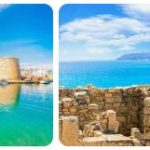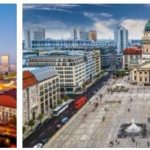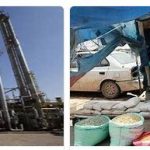Cyprus is an island in the eastern Mediterranean, S of the Turkish coast, W of the Syrian coast. Since 1974 it has in fact been divided into two states: the Republic of Cyprus and the Turkish Republic of Northern Cyprus, a state not recognized by the international community. Between the two states there is a buffer zone under the control of the UN. On the island there are also two areas under British sovereignty, home to military bases: Akrotìrion and Dekèleia.
Physical characteristics
The coasts, high and importuous in the northern part, are divided elsewhere in large inlets (bays of Famagusta and Larnaca). The interior is occupied by two series of mountainous reliefs, with an EW trend, separated by the Messaria plain; the northern chain, of Mesozoic limestone, culminates at 1022 m; the southern one, made of volcanic rocks, reaches its maximum height in the Tròodos Mountains (1953 m). The climate is typically Mediterranean, with hot, dry summers and mild, scarcely rainy winters; annual rainfall is around 350-600 mm, except on the Tròodos, where they are significantly higher.
Population
The population of Cyprus is composed of two main ethnic groups: the Greek (78%), Christian-Orthodox belonging to the Cypriot Autonomous Church, and the Turkish (18%), of Muslim religion. The rest is represented by Arab and Armenian minorities. The distribution of the population has undergone at least a partial upheaval following the division of 1974, for which there have been forced displacements between the northern area, controlled by the Turkish element, and the southern, Greek one, in addition to the arrival of numerous new immigrants from Turkey. In the Turkish community, rural settlements prevail and the population considered urban does not exceed 40%; in the Greek area, on the other hand, the percentage of urban population is higher (69.6%). Among the cities, by far the largest agglomeration is Nicosia, even though it found itself in a difficult geopolitical position on the border. Other important centers are Limassol, on the southern coast, Larnaca and Famagusta, the main center of the Turkish Cypriot state.
Economic conditions
The division of Cyprus had heavy repercussions in the economic field and gave rise to differentiated development processes. However, very soon – thanks also to the intervention of international bodies and foreign powers most interested in maintaining the balance in the eastern Mediterranean – the situation normalized and the Cypriot economy is now expanding. The entry of the Republic of Cyprus into the European Union (2004) and the opening of the commercial and financial markets led to constant growth of more than 3%. The northern Turkish Cypriot region, on the other hand, which has suffered most deeply from the disintegration of the unitary state (only the financial aid of the Turkish government has contained the crisis), continues to suffer from its diplomatic isolation. For Cyprus public policy, please check paradisdachat.com.
The greatest contribution to the island’s economy comes from tourism, which employs 60% of the active population and is widespread above all in the southern Greek-Cypriot area (in 2006 more than 3,000,000 people entered the whole island). In addition, offshore financial activities have also experienced sustained growth(favored by a 2001 tax reform to limit illegal activities) and maritime activities. Agricultural activities are conditioned by a difficult morphology and by an irregular rainfall; mainly cereals, legumes, vegetables, fruit, potatoes and vines are grown. Breeding (sheep and goats) is of limited importance, fishing is more profitable, especially sponge fishing. The industrial sector is expanding, with agri-food, textile, tobacco and cement industries; there are also chemical and metallurgical plants. An oil refinery is in operation in Larnaca. Mineral resources are modest (iron, copper, chromite, pyrite and gypsum).
The internal communications system, not having Cyprus railways, is based on over 12,000 km of roads. Nicosia airport has considerable importance for international traffic. Limassol is the most important port of the whole island: there are constant connections with Greece and the Near East.








